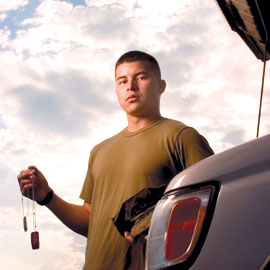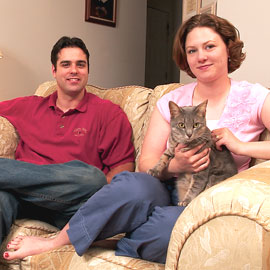 |


|
Spring 2004 | Volume 26, Number 6 | Features |
||||||
| Home From Iraq TWO ALUMNI SEEK A SENSE OF PEACE IN THE WAKE OF WAR STEVE CAMPBELL ’03 CAN’T SPEND A DAY at the beach without flashing
back to the sandstorms that ravaged his tent and made life miserable
in the deserts of Iraq.
When Anne Marie Olney Sterling ’00 makes dinner in her Fayetteville, North Carolina, home, she sometimes hears staged explosions from the military base a few miles away. Even though she’s not in danger, and months have passed since she was in Baghdad, her heart still skips a beat. That’s the thing about war, both say: It changes a person. Campbell and Sterling don’t know each other, but if they met they’d have plenty to talk about — the harshness of desert living, the threat of chemical weapons, the loneliness, and the challenges to their faith while in a hostile environment far from home. LIFE IN THE DESERT Steve Campbell was a senior at Seattle Pacific University when his Marine unit was called up for war. With only a quarter to go until graduation, Campbell, who signed up as a reservist in his sophomore year, had every reason to want to stay behind. He had a great job as a peer advisor on campus, and he was in a committed relationship heading toward marriage. “I had the choice to stay,” says Campbell, who might have been granted a special higher-education exemption. But he didn’t choose that. “I put a lot of thought and prayer into it, and I knew that God would use me out there.” With only a few days’ notice, the electrical engineering major packed up, said goodbye and went to war like any other soldier in the First Marine Division’s Sixth Engineer Support Battalion. Then a corporal, Campbell likens his first night in the desert to a fireworks show. “There were loud booms, and we could see incoming missiles,” he says. “We were prepared for the worst.” But the “worst” came in the form of sandstorms, not chemical weapons. “They were brutal,” says Campbell. “You can’t see your hand in front of your face, and it feels like thousands of needles hitting your body.” Even still, there was a job to do. “Our mission was to lay fuel lines from Kuwait into Iraq,” he says. Think of a gigantic spool of thread unraveling through the desert — that was Campbell’s morning, noon and night. “As we were moving into Iraq, we arrived at the first water purification point, and we needed to get to the other side of the Euphrates River,” he recalls. So two soldiers from Campbell’s battalion were sent ahead. “They both drowned,” says Campbell quietly. “We all knew people were going to die in this war. You just had to let it roll off your back. That’s the way you had to face death out there. ”Laying bulk fuel lines may have been his official job, but Campbell’s duties went far beyond that. “Our unit really didn’t have a lay leader — the person who is the religious point of contact for the platoon,” says Campbell. So he filled that role. “I had quite a few opportunities to talk about God, and I took hold of them. One of the guys was an atheist, but he took the time to read the Bible cover to cover and was working on the Koran. At the time, I was reading a book, The Flight of Peter Fromm, for my UCOR 3000 class, and when I was done reading it, he read it too.” There, in the middle of the desert, the atheist and the Christian held theological debates. While other soldiers passed the time playing card games, Campbell was writing papers for his classes at SPU. “I was getting as much work done as possible. I wanted to graduate.” As fate would have it, though, Campbell didn’t make it home until the week after Seattle Pacific’s Commencement. “It didn’t really hit me until the war was over that I had missed my graduation. That was really hard.” While in Iraq, he also missed his SPU friends and Jessica Mitchell Campbell ’02, now his wife. Theirs was a love story that unfolded through letters. “We wrote each other every day,” he says. “Through our letters, we realized how much we loved each other.” Throughout his deployment, there was a Bible verse, Ephesians 4:13, that strengthened Campbell. “Jessica sent it to me when I was in boot camp, and it’s been in my wallet ever since,” he says. “It reminds me that if I put my faith in the Lord and trust in him, he’ll get me through.” He pauses. “No matter what.” FROM BOSNIA TO BAGHDAD
Sterling says her life after graduation from Seattle Pacific was pretty well planned out. “I graduated, I got commissioned in the Army and I got married in the same week.” Sterling was soon stationed in Bosnia for six months. “That was a great first deployment to learn how to do things at a slower pace before doing them in Iraq. Things were really calm there.” “Calm” to Sterling meant providing medical support for raids of Al Qaeda cells by U.S. soldiers in Bosnia and coordinating the medical response for injuries caused by everything from automobile accidents to friendly fire. As a platoon leader in the Army’s Medical Service Corps, Sterling was the contact for all administrative duties required by the health-care professionals in her unit. When Sterling’s service in Bosnia was complete, rumors began to spread about possible deployment to Iraq. Her unit, the 28th Combat Support Hospital, supports the 18th Airborne Corps, which includes the Army’s most elite: Airborne and Air Assault troopers. “When they go, we know we’re going,” she explains. So she said goodbye to her husband, Rob Sterling ’00, and arrived in Kuwait in March 2003 just before the war’s first round of bombing. “Every couple of hours we’d have to put on our chemical protection gear and our masks and sit in a bunker,” she remembers. “That was probably the most afraid a lot of us had ever been, but somehow we knew the worst was yet to come." As Sterling crossed the border into Iraq, the real work began. “I took care of the medical personnel so they could worry about the patients,” she says. Along the way she saw tragedy: two Iraqi boys who picked up a mine before it exploded, an ambulance hit by a rocket-propelled grenade and sick Iraqi infants left at the military camp gates. In Baghdad, Sterling was assigned to the Ibn Sina Hospital, the former personal hospital of Saddam Hussein and the country’s Ba’ath party elite. “It was just a few blocks down the road from his big palace in the city,” she says. Before the 72-bed hospital was operational, however, there was housekeeping to do. “We took down all of the huge, framed photos of Saddam,” notes Sterling. They also found medical records for top members of the Ba’ath party. These were handed over to U.S. officials. The most painful memory of Baghdad, says Sterling, was the day an American Chinook helicopter crashed. “It was full of soldiers who were going on leave,” she says. “It was really hard to know that their families were expecting them home in a day and a half, and they weren’t coming home.” Sterling says she relied on strength from God to get her through, but it wasn’t easy. “I struggle with my relationship with the Lord when I’m deployed,” she says. “It’s hard to find Christian friends, and it becomes an inner-strength battle for me. “I got a little bit depressed in Iraq, but I just toughed it out. The Army warrior ethos is to be strong. And that’s what you do.” So when explosions sounded across Baghdad, she didn’t panic. “I’d get on Instant Messenger and talk to my sister at SPU. I’d type, ‘Hey, does it say anything on CNN? What’s going on?’” Through it all, one thing motivated her, says Sterling: “I knew that I was making it possible for doctors and nurses to save the lives of American soldiers and Iraqi civilians. So many Iraqis said, ‘Thank you. We didn’t know that you guys would do this for us.’” Sterling returned home in January of this year, and she says her family loves to talk about her adventures. “My dad’s so funny; he tells tall stories about me, and he usually gets it wrong. If you ask him, I’d be a Ranger with a machine gun — you know, like Rambo. He exaggerates just a little, but that’s OK,” she says. LIFE AFTER WAR Even if their paths didn’t cross in the desert, Sterling and Campbell have more in common today than just SPU and Iraq. Both young veterans have the aftermath of war to face, and they are honest about what that means. “Unless you’ve been to war, you don’t understand how it changes you,” says Campbell. Sterling agrees. “For instance, anyone who says that being away from your spouse doesn’t affect your marriage is in denial or lying,” she says. Part of the healing process is moving on with life. Sterling plans to start a one-year lab officer training course in Washington, D.C. And since returning from Iraq, Campbell has graduated, married, received an officer’s commission and completed a cross-country move to Quantico, Virginia, for officer training. The two soldiers say they believe in the justness of the war in Iraq and aren’t upset by protestors. “That’s one of the things this nation is all about — speaking your mind,” Campbell says. “It’s the military’s job to fight for every citizen’s freedom.” And in some ways, Sterling and Campbell are still fighting, but for a much more personal cause: the sense of normalcy and peace that characterized their lives before deployment. Now that they’re home, both veterans say it’s a battle they intend to win. — BY SARAH JIO Back to Home |
|

